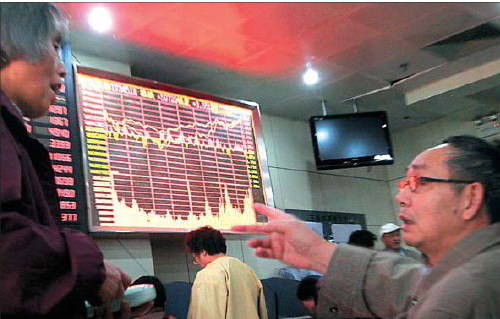Stock market bounces back
Updated: 2007-11-15 07:50
SHANGHAI: The stock market rebounded Wednesday on the heels of a jump in Wall Street shares, pushing the index up nearly 5 percent.
The benchmark Shanghai Composite Index rose 4.94 percent, or 254.57 points, to close at 5412.69, after sliding 13.4 percent from the beginning of this month. Gainers outnumbered losers by 831 to 14. The Shenzhen Component Index increased 3.63 percent to close at 17355.55.
|
|
The turnover on the two bourses amounted to 127.26 billion yuan Wednesday, with heavy buying and selling in the afternoon trading.
The stock markets in Hong Kong and other Asian markets also jumped as a reaction to the recovery of the US stock market the day before.
The Hang Seng Index soared 4.86 percent to close at 29155.01, while Japan's Nikkei Index rose 2.47 percent to close at 15499.56.
Large-cap stocks led the rally Wednesday as a knee-jerk reaction to the rise of their H-share counterparts. PetroChina jumped 5 percent to close at 38.88 yuan, while its H share increased 7 percent to close at 15.74 yuan.
Analysts said that the rebound of PetroChina, which is the largest company in terms of market capitalization and will be included in the main index next Monday, triggered the rebound of other oil stocks and large-caps.
"Many stocks, especially large-caps, have fallen substantially to reach a reasonable price, which propelled institutional investors, including mutual funds, to again include them in their portfolios," Wu Feng, an analyst at TX Investment Consulting Co Ltd, said.
The average price-earnings ratio (P/E) of the constituent stocks in the CSI 300 index was 38.96 Wednesday, which analysts said is a more reasonable level.
"A P/E ratio under 40 is reasonable, and the market is not likely to require a sharp correction in the short term," Qin Hong, an analyst at Bohai Investment Research Institute, said.
The issuance of new mutual funds, which is expected to raise 80 billion yuan this year, is likely to fuel the stock market.
However, analysts said that further interest rate hikes in response to October's high consumer price index is imminent and will raise concern among investors, but the market trend would not change.
"A correction in the A-share market and further moderate monetary tightening can be seen as healthy developments," JPMorgan Securities China Equities chairman Jing Ulrich said.
"Meanwhile, programs such as QDII are leading to greater capital outflows. These trends will take some pressure off the excess liquidity situation in China."
|
|
|
||
|
||
|
|
|
|
